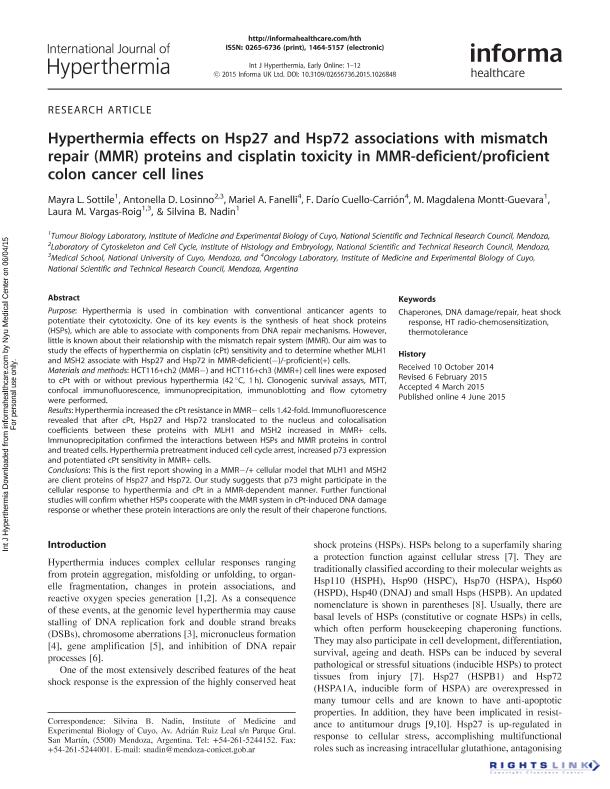Artículo
Hyperthermia effects on Hsp27 and Hsp72 associations with mismatch repair (MMR) proteins and cisplatin toxicity in MMR-deficient/proficient colon cancer cell lines
Sottile Fleury, Mayra Lis ; Losinno, Antonella Denise
; Losinno, Antonella Denise ; Fanelli, Mariel Andrea
; Fanelli, Mariel Andrea ; Cuello Carrión, Fernando Darío
; Cuello Carrión, Fernando Darío ; Montt Guevara, Maria Magdalena
; Montt Guevara, Maria Magdalena ; Vargas Roig, Laura Maria
; Vargas Roig, Laura Maria ; Nadin, Silvina Beatriz
; Nadin, Silvina Beatriz
 ; Losinno, Antonella Denise
; Losinno, Antonella Denise ; Fanelli, Mariel Andrea
; Fanelli, Mariel Andrea ; Cuello Carrión, Fernando Darío
; Cuello Carrión, Fernando Darío ; Montt Guevara, Maria Magdalena
; Montt Guevara, Maria Magdalena ; Vargas Roig, Laura Maria
; Vargas Roig, Laura Maria ; Nadin, Silvina Beatriz
; Nadin, Silvina Beatriz
Fecha de publicación:
07/2015
Editorial:
Informa Healthcare
Revista:
International Journal Of Hyperthermia
ISSN:
0265-6736
Idioma:
Inglés
Tipo de recurso:
Artículo publicado
Clasificación temática:
Resumen
Purpose: Hyperthermia is used in combination with conventional anticancer agents to potentiate their cytotoxicity. One of its key events is the synthesis of heat shock proteins (HSPs), which are able to associate with components from DNA repair mechanisms. However, little is known about their relationship with the mismatch repair system (MMR). Our aim was to study the effects of hyperthermia on cisplatin (cPt) sensitivity and to determine whether MLH1 and MSH2 associate with Hsp27 and Hsp72 in MMR-deficient(-)/-proficient(+) cells.Materials and methods: HCT116+ch2 (MMR-) and HCT116+ch3 (MMR+) cell lines were exposed to cPt with or without previous hyperthermia (42 °C, 1 h). Clonogenic survival assays, MTT, confocal immunofluorescence, immunoprecipitation, immunoblotting and flow cytometry were performed.Results: Hyperthermia increased the cPt resistance in MMR- cells 1.42-fold. Immunofluorescence revealed that after cPt, Hsp27 and Hsp72 translocated to the nucleus and colocalisation coefficients between these proteins with MLH1 and MSH2 increased in MMR+ cells. Immunoprecipitation confirmed the interactions between HSPs and MMR proteins in control and treated cells. Hyperthermia pretreatment induced cell cycle arrest, increased p73 expression and potentiated cPt sensitivity in MMR+ cells.Conclusions: This is the first report showing in a MMR-/+ cellular model that MLH1 and MSH2 are client proteins of Hsp27 and Hsp72. Our study suggests that p73 might participate in the cellular response to hyperthermia and cPt in a MMR-dependent manner. Further functional studies will confirm whether HSPs cooperate with the MMR system in cPt-induced DNA damage response or whether these protein interactions are only the result of their chaperone functions.
Archivos asociados
Licencia
Identificadores
Colecciones
Articulos(IHEM)
Articulos de INST. HISTOLOGIA Y EMBRIOLOGIA DE MEND DR.M.BURGOS
Articulos de INST. HISTOLOGIA Y EMBRIOLOGIA DE MEND DR.M.BURGOS
Articulos(IMBECU)
Articulos de INST. DE MEDICINA Y BIO. EXP. DE CUYO
Articulos de INST. DE MEDICINA Y BIO. EXP. DE CUYO
Citación
Sottile Fleury, Mayra Lis; Losinno, Antonella Denise; Fanelli, Mariel Andrea; Cuello Carrión, Fernando Darío; Montt Guevara, Maria Magdalena; et al.; Hyperthermia effects on Hsp27 and Hsp72 associations with mismatch repair (MMR) proteins and cisplatin toxicity in MMR-deficient/proficient colon cancer cell lines; Informa Healthcare; International Journal Of Hyperthermia; 31; 5; 7-2015; 464-475
Compartir
Altmétricas



